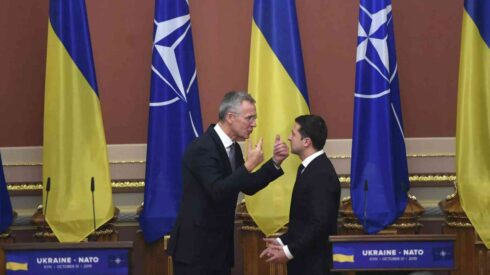Written by Ahmed Adel, Cairo-based geopolitics and political economy researcher
Ukrainian Foreign Minister Dmitry Kuleba stated that Ukraine was not invited to attend the Vilnius summit itself but was only invited to participate in the NATO-Ukraine Council, which will be held on the summit’s sidelines. With this move, NATO disappointed Kiev by not providing realistic prospects of becoming a full alliance member, even though the Eastern European country received huge amounts of financial and military aid during the conflict.
Kuleba also complained about the unambiguously negative attitude of NATO member countries regarding Ukraine’s membership, particularly that of Germany.
“Do not repeat the mistake Chancellor Merkel made in Bucharest in 2008 when she fiercely opposed any progress towards Ukraine’s NATO membership,” he said on July 1. “Because if Ukraine was accepted in NATO by 2014, there would not [have been] the illegal annexation of Crimea. It would not be war in Donbas, there would not be this large-scale invasion.”
According to a statement made by Kuleba at the end of June, “All conditions are there to extend the invitation to Ukraine. If NATO fails to deliver, it means that, again, the logic of fear will prevail, and it means that Putin again benefit from it. And that’s what we’re fed up with.”
At the same time, it is not excluded that Kiev will not participate on the sideline of the NATO summit since Ukraine has been disappointed, even though it does not have candidate status. Despite not having candidate status, Ukraine still manages to be invited to many of the meetings in some capacity. Due to this, Kiev now thinks it can manipulate its way to NATO membership by threatening not to participate in summits. This is, of course, a ridiculous notion.
Kiev has probably not lived up to the expectations and hopes of many of the NATO members during the conflict with Russia, particularly the US, Poland, and Baltic states. It cannot be excluded that many bloc members will probably start to refuse to supply Ukraine with weapons because it no longer makes any sense since much money has been spent, and NATO countries have devastated their military arsenals to help Ukraine. Many NATO members believed that Ukraine was supposed to beat Russia in the so-called “Spring Offensive,” but Ukraine has not achieved any results after launching the offensive at the beginning of summer.
The summit in Vilnius, by all accounts, should show the unity of NATO and Ukraine. Since Ukraine did not achieve the desired results during its offensive against Russia, even though boisterous claims of impending success were made in the months leading up to it, some NATO members could now reconsider their position. NATO needed Ukraine to win this conflict, invested much money, and supplied weapons, including the Leopard tanks, the Patriot anti-aircraft defence systems, and much more. Ukraine has already lost in every respect.
With the reality that Ukraine has lost the war and will not achieve NATO membership, Ukrainian President Volodymyr Zelensky has stated that he sees no reason to attend the Vilnius summit. Nonetheless, despite his tantrum, it is likely that he will somehow participate in the NATO summit, especially since the alliance wants Ukraine to continue exhausting its resources and manpower to weaken Russia as much as possible, if possible. Even more desperately, NATO wants Ukraine to regain control of the northern Black and Azov Seas.
At the same time, the Alliance would automatically enter a war with Russia if Ukraine was to become a member. The fifth article of the NATO treaty ensures mutual defence for every member. This is the source of Kiev’s obsession with becoming a NATO member.
At the same time, Kiev is becoming a big problem for the West because of its neo-Nazism. The alliance can be discredited in the future because having such a member will be hugely questionable to the majority of the world.
Furthermore, it is almost guaranteed that the NATO-Kiev relationship will not be the same as before, especially if Kiev does not achieve some meaningful results at the Vilnius summit. Of course, on the surface, the performance of never-ending support and solidarity will continue for a while. However, as economic crises deepen and domestic political pressure mounts, more and more European NATO members will be unwilling to support Ukraine materially and financially.
The NATO summit will be held in Vilnius on July 11-12. NATO Secretary General Jens Stoltenberg said clearly on June 19 that at the meeting, the allies would not discuss Ukraine’s official invitation to NATO but would talk about what solutions will bring Kiev closer to joining the bloc. As said, this will unlikely satisfy Kiev, but it is the harsh reality it faces, and no amount of complaining from Zelensky, Kuleba or any other puppet head of the regime will change that reality.


